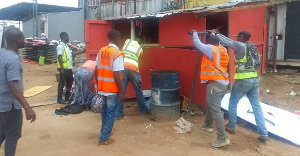Regional News of Wednesday, 27 July 2022
Source: crimecheckghana.org
CCF’s latest documentary: Imprisoning the poor for finding a source of livelihood
Finding a source of livelihood for many poor and vulnerable persons in Ghana has been characterised as a criminal activity.
This is because the activities of these poor individuals who tend to be vagrants clash with the bye-laws of Metropolitan, Municipal, and District Assemblies (MMDAs).
Vagrants are persons who engage in petty economic activities for their survival. They include street vendors, head porters, truck pushers, market women, and drivers, among others.
In maintaining law and order in the various MMDAs, the rights of these vagrants are abused by officials especially taskforce members assaulting and manhandling these poor persons who as a result of the absence of social amenities like markets, lorry parks, toilet facilities, and many others carry out their activities at unauthorized places.
The provision of these amenities is however the mandate of MMDAs but they have neglected their duties and tend to enforce their bye-laws.
In creating a fair society and to stem the abuses, Crime Check Foundation (CCF) in a collaboration with the Open Society Initiative for West Africa (OSIWA) embarked on a sensitization drive to educate vagrants on Assembly bye-laws to enable them to know their rights and responsibilities and also put authorities on their toes in executing their mandate of creating enabling environments for vagrants to thrive.
This move was dubbed, Decriminalizing Vagrancy Laws Advocacy (DVLA) project, which was carried out in twelve (12) MMDAs in three regions; Greater Accra, Ashanti, and Central Regions.
This comes at the back of an opinion ruling by the African Court on Human and Peoples’ Rights on 4th December 2020, which says that laws that tend to affect mainly the poor contravene the African Charter on Human and Peoples’ Rights and other international Human Rights Instruments that Ghana has ratified.
The main objective of the project is to create an enabling environment for vagrants to know, claim and exercise their rights and responsibilities in Ghana.
In carrying out the project, CCF engaged stakeholders briefing them on its findings about the abuses of vagrants and also courting their support to help forestall abuses of vagrants.
After the successful execution of the first phase of the project, the Foundation has highlighted the plights of vagrants in a ten (10) minutes documentary.
“The Assembly taskforce seize our items and assault us. We do not have anywhere to go because this is where we sell to be able to cater to our children’s needs,” a street vendor is heard fuming in the video.
Another vagrant is heard saying, "sometimes the taskforce members forcefully take Gh¢100 from us even after confiscating our goods."
Speaking on behalf of the Chief Justice, at the launch of the project, an Appeals Court Judge, Her Ladyship Justice Sophia Rosetta Bernasko Essah condemned the jailing of vagrants saying it amounts to abuse of their fundamental human rights.
According to Her Ladyship, it is unfair to jail people based on their financial status.
“… only a few people would want to be homeless and, it violates the tenets of fairness to jail, someone, because of their financial catastrophes. It is against human rights and it is against their fundamental rights”, she noted.
Many other government dignitaries threw their weight behind CCF and OSIWA to ensure the right of the poor and vulnerable are protected.
The two organisations are seeking to extend the project to other MMDAs across the country as the general public and stakeholders mount calls for larger coverage.
The documentary would be aired on GTV and the social media handles of CCF and OSIWA.
Entertainment










